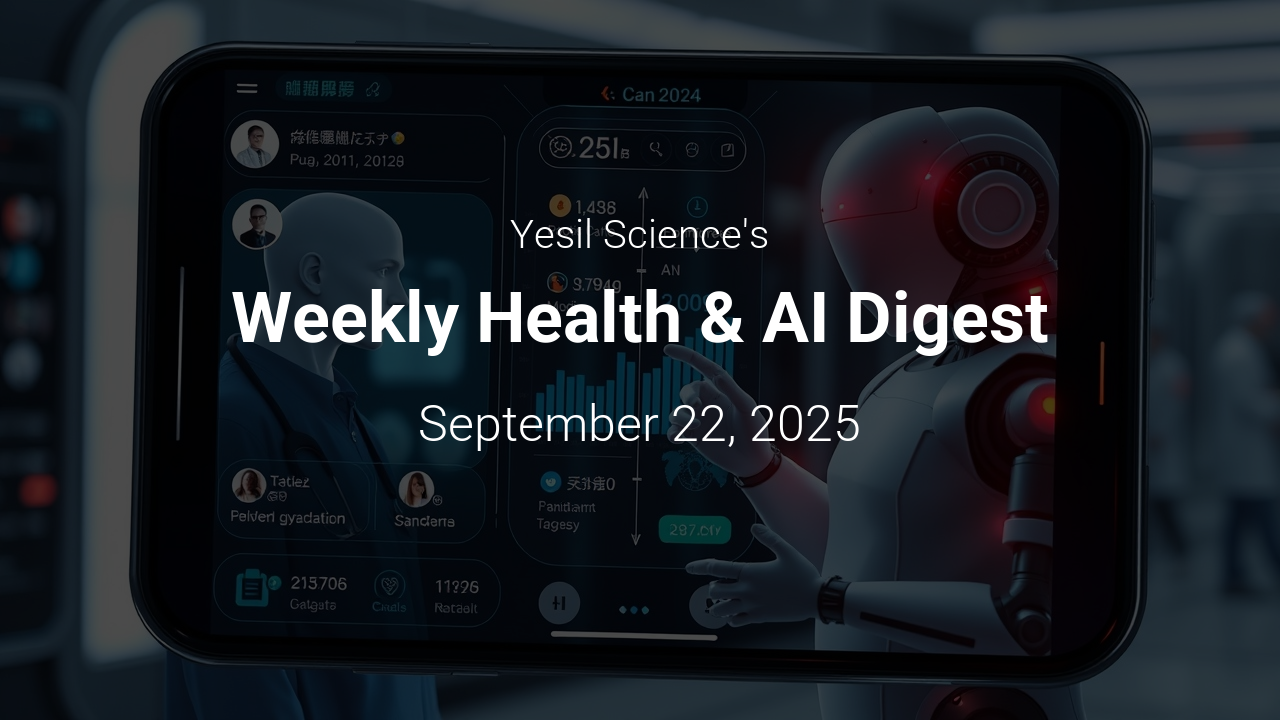Here are the latest breakthroughs in health & AI (September 22, 2025 week)
🔹 New App Enhances Healthcare Communication with Pocketalk and Zebra Collaboration
New app improves healthcare communication through Pocketalk and Zebra collaboration. 🌍📱 It translates conversations in over 92 languages.
——-
🔹 Proceedings of the Second Artificial Intelligence in Primary Immunodeficiencies (AIPI) Meeting.
AI in Primary Immunodeficiencies: Key Insights from AIPI Meeting 🤖💉
——-
🔹 Sustainable anticoagulation for climate resilient care.
Sustainable anticoagulation: Reducing carbon emissions in care through innovative strategies and digital health technologies. 🌍💉
——-
Exploring AI’s impact on healthcare: Gender, competence, and misconduct correlations revealed. 📊👩⚕️
——-
📊 Spinal Modic Changes: 603 Articles, 168 Journals, Key Hotspots Identified! 🧠
——-
🔹 Concerns Raised Over Online Consultation Changes by BMA
BMA raises concerns about online consultation changes, urging government safeguards to prevent overwhelming GP practices. 🏥💻
——-
AI in Healthcare: ChatGPT outperforms Gemini in patient queries on knee surgery! 📊🤖
——-
🔹 New Pilot Program to Enhance Kidney Disease Management at Sunderland Royal Hospital
Sunderland Royal Hospital initiates a pilot program with Kidney Beam to improve kidney disease management through online physiotherapy and health coaching. 🏥💪
——-
🔹 Detection and score grading for prostate adenocarcinoma using semantic segmentation.
Prostate cancer detection improved: 92% accuracy using deep learning on 100 biopsy images. 📊🔬
——-
🔹 Support for 5G Healthcare Innovations in North East England
Support for 5G healthcare innovations in North East England aims to enhance patient care and efficiency. 🏥📶
——-
AI in Thyroid Ultrasound Training: 70% Accuracy Achieved! 🤖📊 Automated assessments enhance skill evaluation in medical simulations.
——-
“Exploring SynthMedic: 900 synthetic discharge summaries with 94.35% usability score! 🤖📄”
——-
🔹 AI Model Enhances T-cell Immunotherapy and Vaccine Development
AI enhances T-cell immunotherapy and vaccine development, improving predictions of T cell responses. 🤖💉
——-
🔹 [Cough frequency monitoring: current technologies and clinical research applications].
Cough frequency monitoring: key technologies and clinical applications revealed in recent research. 📊🤒
——-
🔹 AI Models Enhance Predictions for Chronic Kidney Disease Progression
AI models improve predictions for chronic kidney disease progression, aiding early detection and management. 🩺📈
——-
Deep learning model detects orbital fractures in youth radiographs: AUROC 0.802, sensitivity 65.8%, specificity 86.5%. 📊👁️
——-
🔹 Improved Digital ECG Access at Barts Health Enhances Patient Care
Digital ECG access at Barts Health improves patient care, enabling faster decisions and reducing errors. Enhanced efficiency benefits all. 📈❤️
——-
🔹 Social Media Recruitment in Indigenous and Native American Populations: Challenges in the AI Age.
Social media recruitment for Indigenous populations faces AI challenges. Limited success, data quality issues, and effective strategies explored. 📊🤝
——-
🔹 Importance of Mentorship in Digital Health Leadership
Mentorship in digital health is vital for career growth and collaboration. It fosters confidence and innovation in challenging environments. 🌐🤝
——-
Predicting severe renal dysfunction in cirrhosis: MELD score shows 80% prevalence at high levels. Machine learning enhances accuracy! 📊🔍
——-
That’s a wrap for this week’s digest! Stay tuned for more health & AI updates. 🚀💡
#HealthAI #TechNews
